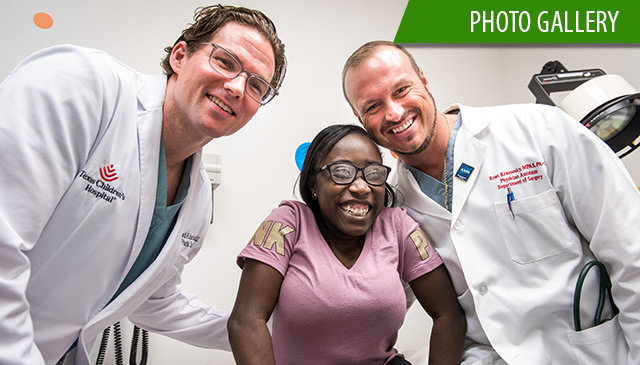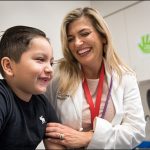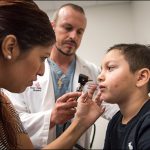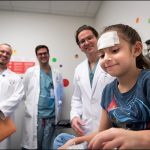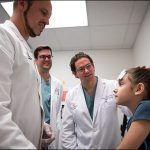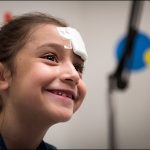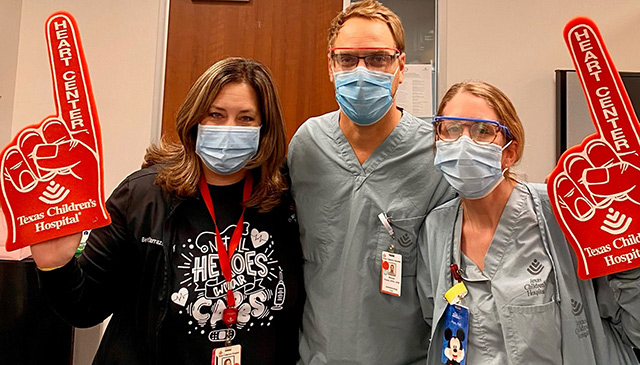
From nurse practitioners, physician assistants and nurse midwives to certified nursing specialists, certified registered nurse anesthetists and clinical nurse specialists – advanced practice providers (APPs) are elevating the field of medicine and ensuring Texas Children’s delivers high-quality, evidence-based care to our patients and their families.
Set for Oct. 11-16, National APP Week is an opportunity to recognize the hard work of these professionals and raise awareness of the unique role they play in providing increased access and enhancing care for a rapidly growing patient population.
APPs are trusted medical professionals with advanced education and training at the post-graduate and doctoral level. These providers work hand-in-hand with physicians to create a seamless environment of care, making more appointments available for patients. They also support a team-based approach.
“When I started at Texas Children’s, many barriers had to be broken down,” said Veronica Victorian, assistant director of Surgical Advanced Practice. “Signs were placed in clinic to explain what an APP is and how they function – not only for patients, but for staff.”
The growth in the number of APPs across the organization and our various service lines since those early days is a strong reflection of their significant contributions and continued impact.
Ryan Krasnosky, chief of Wound Care, remembers starting his Texas Children’s career as one of less than five Surgical APPs. “The Department of Surgery alone now has over 130,” he said.
What do APPs do?
APPs are now a fixture in many areas of medicine and locations throughout our institution: at our primary care clinics, in acute and critical care, emergency medicine and subspecialty and perioperative services. But when Shannon McCord started at Texas Children’s in 1991 as a clinical nurse specialist in the pediatric intensive care unit, the role was so new she had to write her own job description.
“I went on to become a pediatric nurse practitioner specializing Wound, Ostomy and Continence Care,” said McCord, director of Advanced Practice Providers and Nursing Clinical Support Services, Community. “Now, 30 years later, we have more than 400 advanced practice providers delivering care across our system – serving not only in the hospital setting, but in our community locations that include the Centers for Women and Children, Subspecialty Care Clinics, TCP, Urgent Care and Austin.”
The scope of the APP’s duties finds these providers completing many tasks that doctors would complete – minor office procedures, management of routine diagnoses, providing medical education, assisting in the operating room and writing prescriptions. Yet rather than replacing doctors, APPs instead work collaboratively, under the supervision of a physician.
“As the profession has grown, we’ve seen a higher prevalence of APPs in subspecialized care,” said Angela Gooden, director of Advanced Practice at Texas Children’s. “This collaborative relationship often develops into a very autonomous APP role.”
Given the rising demands of health care delivery and shortages in the number of physicians to meet them, it has become widely accepted that important work could not be accomplished for patients and families without the partnership of APPs.
The APP role during the pandemic
The essential nature of our APPs has been even more apparent since the onset of the COVID-19 pandemic, which has required frontline team members to be nimble to care for our patients and their families amid an uncertain and rapidly changing situation.
Texas Children’s versatile APPs aided vaccine clinics, filled roles in numerous departments, participated in COVID-19 testing and worked together to coordinate care. Every time they were asked to step up to a new challenge, much like those in other team-centric departments, these providers responded in remarkable fashion – paving the way for many initiatives adopted during the pandemic to stay in place long-term.
Join the celebration!
There is no doubt Texas Children’s APPs have proven through their dedicated service over the years that they are adaptable, flexible and collaborative members of our One Amazing Team.
Join us in thanking our APPs for their commitment and contributions during National APP Week and all year-round! A planning committee comprised of Danielle Comeaux, Caitlin Justus, Karen Hizon, Jordan Rodriguez and Vianey Ruiz will be hosting special events and activities throughout the week. Look for photos from the celebrations on the @texaschildrenspeople Instagram.


